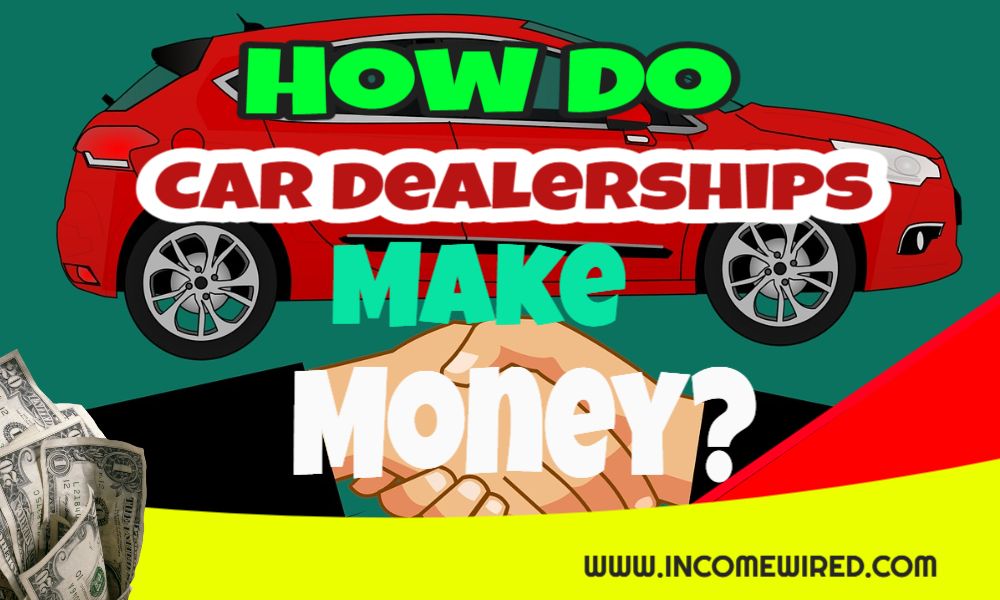we help service-based business owners, freelancers, and aspiring businesses with our content & services & When readers purchase services discussed on our site, we often earn affiliate commissions that support our work. Find out more about Income Wired
Car dealerships make money in a few different ways. The most common is through the sale of vehicles. Sometimes, dealerships will also make money through the financing of vehicle sales, and other times they may make money from the servicing and repair of vehicles. In any case, there are a few different ways that car dealerships can generate revenue.
Dealerships typically make a profit margin of about 3-5% on the sale of a new vehicle. This number can vary depending on the type of vehicle being sold, as well as the dealership’s overhead costs. For example, if a dealership sells a high-end luxury car, they may only make a 2% profit margin, while if they sell a more budget-friendly car, they may make a 5% profit margin. In any case, the sale of vehicles is typically the largest source of revenue for dealerships.
Dealerships can also generate revenue through the financing of vehicle sales. When customers finance their vehicle purchase through the dealership, the dealership will usually make a small profit on the transaction. This profit is typically around 1%, but it can vary depending on the terms of the financing agreement.
Another way that dealerships make money is through the servicing and repair of vehicles. Dealerships typically have their own service departments where customers can take their vehicles to get routine maintenance or repairs done. The service department will then charge the customer for parts and labor. The dealership will usually mark up the price of parts by a small amount, and will also charge labor rates that are higher than what an independent garage would charge. This allows the dealership to make a profit on the servicing and repair of vehicles.
Overall, car dealerships generate revenue in a few different ways. The most common is through the sale of vehicles, but dealerships can also make money through financing, servicing, and repairs. Each of these methods can contribute to the bottom line of the dealership.
How Much Profit Does a Dealership make on a Car?
The average profit a dealership makes per car sold is about 3-5%. This number can vary depending on the type of vehicle being sold and the overhead costs of the dealership. For example, if a dealership sells a high-end luxury car, they may only make a 2% profit margin, while if they sell a more budget-friendly car, they may make a 5% profit margin. In any case, the sale of vehicles is typically the largest source of revenue for dealerships.
What is the Difference Between the Selling Price and the Invoice Price?
The selling price is the price that the customer pays for the vehicle. The invoice price is the price that the dealership paid for the vehicle from the manufacturer. The difference between these two prices is the profit margin that the dealership makes on the sale of the vehicle.
What is the Difference Between the Manufacturer’s Suggested Retail Price (MSRP) and the Dealer Invoice Price?
The manufacturer’s suggested retail price (MSRP) is the suggested retail price for a vehicle that is set by the manufacturer. The dealer invoice price is the price that the dealership pays for the vehicle from the manufacturer. The difference between MSRP and dealer invoice price is called the dealer markup. This is the amount that dealerships add to the cost of a vehicle in order to make a profit.
What Does it Mean if a Car Dealership Offers “No haggle” Pricing?
“No haggle” pricing means that the dealership offers a fixed price for a vehicle, and will not negotiate on the price. This type of pricing is typically used for vehicles that are in high demand, or for vehicles that the dealership needs to move quickly.
What Does it Mean if a Car Dealership Offers “One Price” Pricing?
“One price” pricing means that the dealership offers the same price to all customers, regardless of negotiation. This type of pricing is typically used in order to simplify the car-buying process, and to avoid any potential haggling over price.
What is a Vehicle Service Contract?
A vehicle service contract is an agreement between a customer and a dealership that outlines the terms of service for a vehicle. This type of contract is typically used for new vehicles, and can cover a wide range of services, from routine maintenance to unexpected repairs.
What is GAP Insurance?
Gap insurance is insurance that covers the difference between the amount owed on a vehicle and the actual cash value of the vehicle. This type of insurance is typically used for leases, loans, and financing agreements.
What is an extended warranty?
An extended warranty is an agreement between a customer and a dealership that outlines the terms of service for a vehicle after the manufacturer’s warranty has expired. This type of contract can cover a wide range of services, from routine maintenance to unexpected repairs.
What should I do if I have questions about my car dealership’s pricing?
If you have questions about your car dealership’s pricing, it is best to speak to a salesperson or manager. They will be able to answer any questions that you have, and help you understand the dealership’s pricing structure.
When negotiating with a car dealership, it is important to remember that they are in business to make money. However, there are a few ways that you can negotiate a better price on your vehicle. First, it is important to do your research ahead of time and know the invoice price of the vehicle that you are interested in. This will give you a good starting point for negotiation. Second, be prepared to walk away from the deal if the dealership is not willing to meet your needs. Finally, don’t be afraid to ask for a lower price. Many dealerships are willing to negotiate, and you may be able to get the price that you want.
Do Car Dealers make more on Sales or Service?
Car dealerships make the majority of their profits from selling vehicles. However, they also generate a significant amount of revenue from servicing and repairing vehicles. Many dealerships have their own service departments, and they also sell parts and accessories. In addition, dealerships often offer extended warranties, which can be quite profitable. All of these factors contribute to the bottom line of a car dealership.
How much do dealerships make on New Cars?
Car dealerships typically make a profit of 3-5% on new cars. This means that if a dealership sells a car for $30,000, they will make a profit of $900-$1,500. The actual amount of profit depends on the dealership’s overhead costs, as well as the particular vehicle that is being sold.
How much do dealerships make on Used Cars?
Car dealerships typically make a profit of 10-15% on used cars. This means that if a dealership sells a car for $10,000, they will make a profit of $1,000-$1,500. The actual amount of profit depends on the dealership’s overhead costs, as well as the particular vehicle that is being sold.
How much do dealerships make a month
This answer will vary depending on the dealership’s sales volume and profits. However, a typical dealership may make a profit of $50,000-$100,000 per month. This profit is generated from both the sale of vehicles and the servicing of vehicles.
How much does the average car salesman make in a year?
The average car salesman makes $40,000-$50,000 per year. This income is generated from commission-based pay, as well as bonuses and incentives. The actual amount of money that a salesman makes will depend on the dealership’s pay structure, as well as the salesman’s individual performance.
How Do car dealerships make money on 0 financing
Car dealerships make money on 0 financing deals by charging interest on the loan. This means that even though the customer is not paying any money upfront, the dealership is still making a profit on the deal. The actual amount of profit will depend on the interest rate that is charged, as well as the length of the loan.
What is a dealer fee?
A dealer fee is a charge that is added to the purchase price of a vehicle. This fee is used to cover the costs of doing business, and it is typically around $500. Dealer fees are negotiable, so it is important to ask about them when you are negotiating the purchase price of a vehicle.
The bottom line is that car dealerships make the majority of their money through selling cars. However, they also generate a significant amount of revenue from other sources, such as servicing and repairing vehicles, selling parts and accessories, and offering extended warranties. All of these factors contribute to the bottom line of a car dealership.



